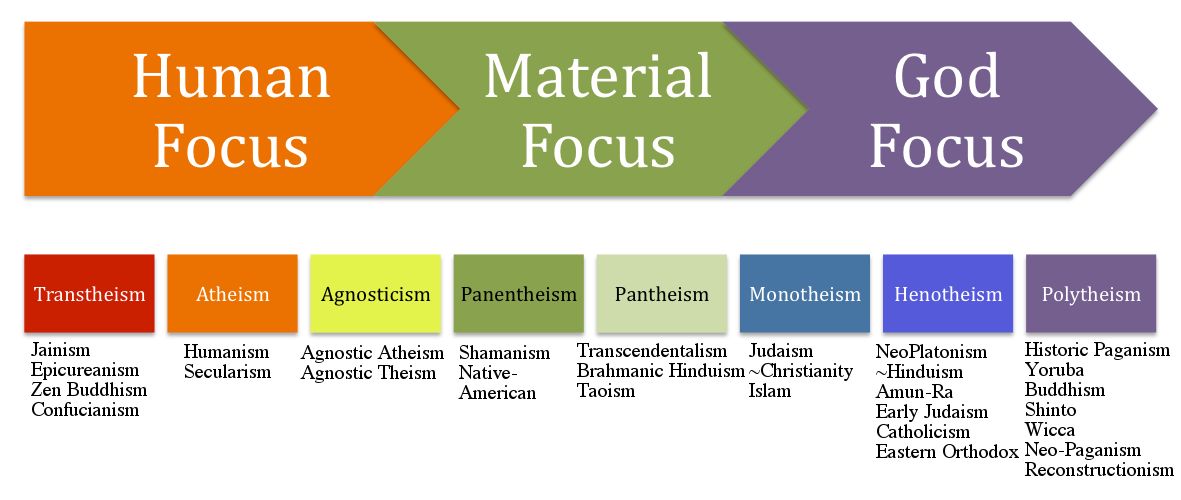Exaltist Ethan
Bridging the Gap Between Believers and Skeptics
The original source: Spectra of Religion and Magic

Upon my research for theology spectrums I came across an article detailing eight distinct theologies abroad a wide range of differing viewpoints regarding God. This includes: transtheism, atheism, agnosticism, panentheism, pantheism, monotheism, henotheism and polytheism.
Human-Focused Theologies Include...
Transtheism is the belief that if God or Gods do exist, they are irrelevant to the development of humans.
Atheism is the disbelief in God or Gods.
Agnosticism is the belief that God or Gods are unknowable, at least to a certain degree.
Material-Focused Theologies Include...
Panentheism is the belief that God is greater than the Universe and includes it.
Pantheism is the belief that God is identical to the Universe, or nature.
God-Focused Theologies Include...
Monotheism, where there is only one God. Note: Includes trinitarianism.
Henotheism, where there are many Gods but one central God.
Polytheism, where there are many Gods on similar standing.
Before anyone asks about my beliefs, syntheism, or simply humans creating God/Gods, is a type of transtheism. Ignosticism, which believes theism is an irrelevant subject matter, and nontheism, which acknowledges that theism is not important, also fit that. Of course there are more specific theologies than this, let's say deism. Most deists believe in one God that does not interfere in the lives of people, but nonetheless created the Universe. That is a type of monotheism.
I am not entirely sure I fully agree with this chart, but it is helpful in understanding the spectrum of theological beliefs nonetheless. There may be other theologies that are not included so I have decided on this poll to include an Other option, provided people who are answering Other give an explanation of their theology. As well, I am opening this poll up for multiple answers from the same person, because theology is a complicated subject and it is entirely possible to combine multiple theologies. I am also making votes public and have people able to change their answers whenever they want. This poll will not close.
Personally, I intend on voting this poll with two answers: transtheism and panentheism. My theology includes The Omniverse as Ultimate Nature, which is a type of panentheism, and my transtheistic beliefs that humankind is evolving their extropy to create and control this deity, which will later become the Synverse.
Alright. Let us know how you answer. What type of theisms are you? Let us know how you think about this topic below.

Upon my research for theology spectrums I came across an article detailing eight distinct theologies abroad a wide range of differing viewpoints regarding God. This includes: transtheism, atheism, agnosticism, panentheism, pantheism, monotheism, henotheism and polytheism.
Human-Focused Theologies Include...
Transtheism is the belief that if God or Gods do exist, they are irrelevant to the development of humans.
Atheism is the disbelief in God or Gods.
Agnosticism is the belief that God or Gods are unknowable, at least to a certain degree.
Material-Focused Theologies Include...
Panentheism is the belief that God is greater than the Universe and includes it.
Pantheism is the belief that God is identical to the Universe, or nature.
God-Focused Theologies Include...
Monotheism, where there is only one God. Note: Includes trinitarianism.
Henotheism, where there are many Gods but one central God.
Polytheism, where there are many Gods on similar standing.
Before anyone asks about my beliefs, syntheism, or simply humans creating God/Gods, is a type of transtheism. Ignosticism, which believes theism is an irrelevant subject matter, and nontheism, which acknowledges that theism is not important, also fit that. Of course there are more specific theologies than this, let's say deism. Most deists believe in one God that does not interfere in the lives of people, but nonetheless created the Universe. That is a type of monotheism.
I am not entirely sure I fully agree with this chart, but it is helpful in understanding the spectrum of theological beliefs nonetheless. There may be other theologies that are not included so I have decided on this poll to include an Other option, provided people who are answering Other give an explanation of their theology. As well, I am opening this poll up for multiple answers from the same person, because theology is a complicated subject and it is entirely possible to combine multiple theologies. I am also making votes public and have people able to change their answers whenever they want. This poll will not close.
Personally, I intend on voting this poll with two answers: transtheism and panentheism. My theology includes The Omniverse as Ultimate Nature, which is a type of panentheism, and my transtheistic beliefs that humankind is evolving their extropy to create and control this deity, which will later become the Synverse.
Alright. Let us know how you answer. What type of theisms are you? Let us know how you think about this topic below.
Last edited:
